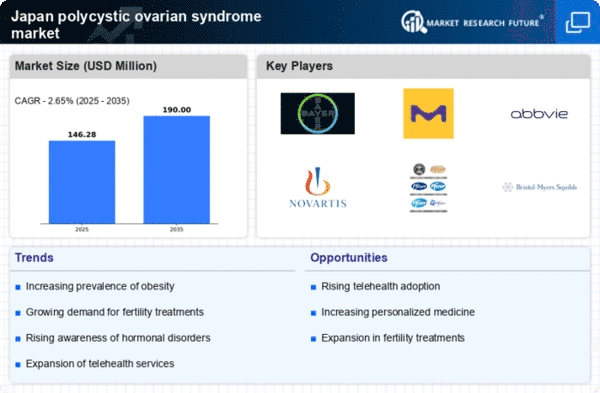Government Initiatives and Support
Government initiatives aimed at improving women's health in Japan play a significant role in shaping the polycystic ovarian-syndrome market. The Japanese government has implemented various health policies and programs to address reproductive health issues, including PCOS. These initiatives often include funding for research, public health campaigns, and the promotion of awareness regarding PCOS. For instance, the Ministry of Health, Labour and Welfare has been known to allocate resources for educational programs that inform women about the symptoms and risks associated with PCOS. Such support not only enhances awareness but also encourages healthcare providers to offer better diagnostic and treatment options, thereby fostering growth in the polycystic ovarian-syndrome market.
Advancements in Diagnostic Technologies
Advancements in diagnostic technologies are transforming the landscape of the polycystic ovarian-syndrome market in Japan. The introduction of innovative diagnostic tools, such as advanced imaging techniques and genetic testing, has improved the accuracy and speed of PCOS diagnosis. These technologies enable healthcare professionals to identify the condition more effectively, leading to timely interventions. As a result, the demand for these diagnostic solutions is expected to rise, contributing to market growth. Furthermore, the integration of telemedicine and digital health solutions is likely to enhance access to diagnostic services, particularly in rural areas, thereby expanding the reach of the polycystic ovarian-syndrome market.
Rising Demand for Personalized Treatment Options
The increasing demand for personalized treatment options is a notable driver in the polycystic ovarian-syndrome market. Patients are increasingly seeking tailored therapies that address their specific symptoms and health profiles. This trend is prompting pharmaceutical companies and healthcare providers to focus on developing individualized treatment plans, which may include lifestyle modifications, hormonal therapies, and fertility treatments. The market is witnessing a shift towards more patient-centric approaches, with an emphasis on understanding the unique needs of women with PCOS. This evolution in treatment paradigms is likely to enhance patient satisfaction and adherence, ultimately driving growth in the polycystic ovarian-syndrome market.
Increasing Incidence of Polycystic Ovarian Syndrome
The rising incidence of polycystic ovarian syndrome (PCOS) in Japan is a critical driver for the polycystic ovarian-syndrome market. Recent studies indicate that approximately 5-10% of women of reproductive age in Japan are affected by this condition. This growing prevalence is likely to increase the demand for diagnostic and therapeutic options, thereby expanding the market. As awareness of PCOS symptoms and complications, such as infertility and metabolic disorders, becomes more widespread, healthcare providers are expected to prioritize early diagnosis and intervention. Consequently, this trend may lead to a surge in the development of targeted treatments and management strategies within the polycystic ovarian-syndrome market, ultimately benefiting patients and healthcare systems alike.
Growing Interest in Nutritional and Lifestyle Interventions
There is a growing interest in nutritional and lifestyle interventions as effective management strategies for polycystic ovarian syndrome in Japan. Research suggests that lifestyle modifications, including dietary changes and exercise, can significantly alleviate symptoms associated with PCOS. This trend is leading to an increased demand for products and services that support healthy living, such as dietary supplements and fitness programs tailored for women with PCOS. As healthcare professionals advocate for holistic approaches to managing the condition, the polycystic ovarian-syndrome market is likely to expand to accommodate these emerging preferences. This shift towards lifestyle-focused management may also encourage collaboration between healthcare providers and wellness industries.
















